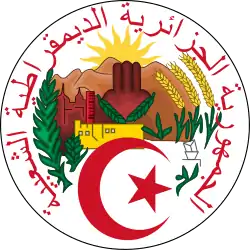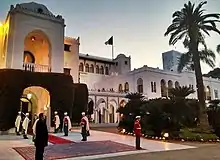Cabinet of Algeria
The Council of Ministers is an Algerian government body established by the Algerian Constitution to discuss and adopt some of the main acts of executive power, such as the tabling of government bills or the appointment of senior officials. It is chaired by the President of the Republic and brings together the Prime Minister, all full-service ministers and, depending on the government, all or some of the lower-ranking ministers. Only a very summary report of the meetings being published, it is also supposed to allow the ministers to freely discuss the policy of the Government. It traditionally meets at El Mouradia Palace, the official residence of the President, although it can be summoned anywhere and at any time by the President.[1]
| Council of Ministers of the People's Democratic Republic of Algeria | |
|---|---|
| مجلس وزراء الجمهورية الجزائرية الديمقراطية الشعبية | |
 | |
| Overview | |
| Established | 1958 Provisional Government of Algeria |
| State | Algeria |
| Leader | Prime Minister |
| Appointed by | President of the Republic |
| Responsible to | People's National Assembly |
| Headquarters | El Mouradia Palace, Algiers |
| Website | www |

The Council is one of the elements allowing the President of the Republic to direct the executive power despite the great role theoretically assigned to the Prime Minister by the Constitution. It enables it to control the development and implementation of Government policy and to give or refuse its agreement to a certain number of important decisions, and, more generally, to mark its views on discussions involving the whole of the Government.[1]
The Council of Ministers is the only formal meeting of all members of the executive branch of the Government. The President may also chair restricted councils comprising certain ministers.[1]
Role
Juridical competence
The Constitution, laws and regulations provide that a number of government decisions must be referred to the Council of Ministers to be valid.[1]
Government bills (the only ones called "bills", private members' bills simply being called "private bills") must be introduced in Council before being introduced in Parliament.
Certain regulatory acts must also be presented to the Council of Ministers before being adopted. These acts are the ordinances, taken in the field of the law by virtue of a temporary authorization, and a certain number of decrees, which are then called "decrees in the Council of Ministers", and concern:
Unlike other regulatory acts which are only signed by the Prime Minister and the ministers responsible for their execution, these acts must also be signed by the President of the Republic and give the President a right of veto over these texts.
A decree in the Council of Ministers, even if no text provided for its inclusion on the agenda, can only be amended by another decree in the Council of Ministers, unless its final provisions or a legislative provision only allows it is modified by simple decree.
In addition, the Prime Minister must consult the Council before committing the responsibility of his Government on his program or a declaration of general policy.
Composition and presidency
The Council of Ministers brings together the President of the Republic, the Prime Minister, full-service ministers and, sometimes, lower-ranking ministers (delegate minister and secretaries of state) or some of them.
The Council is chaired by the President of the Republic. He can "exceptionally" be replaced by the Prime Minister, "by virtue of an express delegation and for a specific agenda". This procedure is extremely rare.
The Secretary General of the Presidency of the Republic and the Secretary General of the Government, who prepare the reports of the meetings, also attend the Council, without taking part in it.
Functioning
Convocation
It is up to the President of the Republic, who chairs the Council, to determine the date and place of its meetings.
The Palace of El Mouradia, the official residence of the President of the Republic, is the normal meeting place of the Council. The Council meets on the ground floor. Ministers are seated in the order of protocol determined by the decree of appointment.
The President of the Republic can however convene the Council elsewhere, for symbolic reasons.
Preparation
For the meeting, the Secretary General of the Government sends a draft agenda to the President of the Republic, the Prime Minister and the ministers. The agenda is set during a meeting between the president and the secretary general, and sent to ministers.
Before the meeting, the President, the Prime Minister, the Secretary General of the Presidency and the Secretary General of the Government have a brief meeting. During this time, the director of the cabinet of the Secretary General of the Government prepares the final version of the press release and has the ministers sign the acts which will be presented to the President during the Council.
Process
Meetings follow a strict agenda that leaves little room for improvisation. The President of the Republic can, on certain particularly important or controversial questions, lead a tour de table so that the ministers express their opinion; he is always the last to speak.
Discussions in the Council of Ministers are supposed to remain confidential. The press release issued after the Council contains only brief and evasive indications.
Other Boards and Meetings
Other councils bringing together members of the Government exist in parallel with the Council of Ministers and supplement it in a restricted field or with a reduced number of participants, the restricted meetings are called "councils" when they are chaired by the President of the Republic. and “committees” when they are chaired by the Prime Minister.
Restricted Councils
Restricted Councils can be held at El Mouradia Palace with the President of the Republic, the Prime Minister, several ministers and senior officials. Although their operation shares many features with the Council of Ministers, they are less solemn and more concrete and are meant to be working meetings.
Interministerial committtees
Small government meetings, called interministerial committees, may be held without the presence of the President. They are chaired by the Prime Minister or by a minister appointed to replace him, and bring together certain ministers concerned by a particular problem, and sometimes senior officials..
Current Cabinet
The government of President Tebboune was made up of 39 members after he took office in January 2020. The following table includes those appointees by Tebboune and other Algerian government offices appointed in previous administrations:[2][3][4]
| Incumbent | Office | Website | Government of |
|---|---|---|---|
| Abdelaziz Djerad[3][2] | Prime Minister[4] | Prime Minister's website | Tebboune |
| Abdelmadjid Tebboune[3][2] | President, Minister of Defence[4] | www |
Tebboune |
| Kamel Beldjoud[3][2] | Minister of Interior and Local Government[4] | www |
Tebboune |
| Sabri Boukadoum[3][2] | Minister of Foreign Affairs[4] | www |
Tebboune |
| Belkacem Zeghmati[3][2] | Minister of Justice and Keeper of the Seals[4] | www |
Tebboune |
| Abderahmane Raoua[2] | Minister of Finance[4] | www |
Tebboune |
| Mohamed Arkab[2] | Minister of Energy[4] | www.energy.gov.dz/ | Tebboune |
| Chems-Eddine Chitour | Minister of Energy Transition and Renewable Energy | ||
| Tayeb Zitouni[3][2] | Minister of War Veterans (Moudjahidine)[4] | www |
Tebboune |
| Youcef Belmehdi[3][2] | Minister of Religious Affairs and Endowments (Wakfs)[4] | www |
Tebboune |
| Mohamed Ouadjaout[3][2] | Minister of National Education[4] | www |
Tebboune |
| Chems-Eddine Chitour[2] | Minister of Higher Education and Scientific Research[4] | www |
Tebboune |
| Hoyam Benfriha[3][2] | Minister of Vocational Education and Training Professionals[4] | www |
Tebboune |
| Malika Bendouda[3][2] | Ministry of Culture and Arts[4] | www |
Tebboune |
| Sid Ali Khaldi[3][2] | Minister of Youth and Sports[4] | www |
Tebboune |
| Mounir Khaled Berrah | Minister of Digitization and Statistics | ||
| Brahim Boumzar[2] | Minister of Post and Telecommunications[4] | www |
Tebboune |
| Kaoutar Krikou[3][2] | Minister of National Solidarity, Family and Women's Affairs[4] | www |
Tebboune |
| Ferhat Ait Ali Braham[3][2] | Minister of Industry and Mines[4] | www |
Tebboune |
| Mohamed Arkab | Minister of Mines | www |
|
| Chérif Omari,[2] | Minister of Agriculture and Rural Development[4] | madrp |
Tebboune |
| Kamel Nasri[3][2] | Minister of Housing, Urban Planning and the City[4] | www |
Tebboune |
| Kamel Rezig[2] | Minister of Trade | www |
Tebboune |
| Ammar Belhimer[3][2] | Minister of Communications and Government Spokesperson[4] | www |
Tebboune |
| Farouk Chadli[3][2] | Minister of Public Works and Transport[4] | www |
Tebboune |
| Lazhar Hani | Minister of Transport | www |
|
| Arezki Berraki[3][2] | Minister of Water Resources[4] | www |
Tebboune |
| Hacene Mermouri,[2] | Minister of Tourism and Handicrafts and Family Work[4] | www |
Tebboune |
| Abderrahmane Benbouzid[2] | Minister of Health, Population and Hospital Reform[4] | www |
Tebboune |
| Ahmed Chawki Fouad Acheuk Youcef,[2] | Minister of Labor, Employment and Social Security[4] | www |
Tebboune |
| Bessma Azouar[3][2] | Minister of Relations with Parliament[4] | www |
Tebboune |
| Nassira Benharrats[2] | Minister of Environment and Renewable Energies[4] | www |
Tebboune |
| Sid Ahmed Ferroukhi[3][2] | Minister of Fishing and Fishery Productions | www |
Tebboune |
| Abderrahmane Lotfi Djamel Benbahmad[2] | Deputy Minister for Pharmaceutical Industry | Tebboune | |
| Mohamed Cherif Belmihoub | Minister Delegate to the Prime Minister in charge of Foresight | ||
| Nassim Diafat | Minister Delegate to the Prime Minister in charge of Micro-business Enterprise | ||
| Yassine Djeridene[2] | Minister of Microenterprise, Start-up and Economy of Knowledge | Tebboune | |
| Bachir Messaitfa | Deputy Minister of Statistics and Forward Planning | ||
| Foued Chehat[2] | Deputy Minister for Sahara Agriculture and Mountains | Tebboune | |
| Aïssa Bekkai[2] | Deputy Minister for Foreign Trade | Tebboune | |
| Yacine El-Mahdi Oualid | Deputy Minister for Start-Ups | ||
| Aissa Bekkal | Minister Delegate to the Minister of Trade in charge of foreign trade | ||
| Hamza Al Sid Cheikh[2] | Deputy Minister for Saharan environment | Tebboune | |
| Nouredine Morceli[2] | Secretary of State for elite sport | Tebboune | |
| Bachir Youcef Sehairi[2] | Secretary of State for Film Industry | Tebboune | |
| Yahia Boukhari[2] | Secretary General of the government | Tebboune | |
| Nassim Diafat[2] | Deputy Minister for Incubators | Tebboune | |
| Rachid Bladehane[2] | Secretary of State for National Community and Experts Abroad. | Tebboune | |
| Salim Dada[2] | Secretary of State for Cultural Production. | Tebboune |
Refereences
- "Algerian constitution in English" (PDF). Constitution Project. Retrieved February 3, 2021.
- "President Tebboune appoints new government members". Algerian Press Service. January 2, 2020. Retrieved February 3, 2021.
- "Algerian Leaders and Cabinet Members". Central Intelligence Agency. Retrieved February 3, 2021.
- "Ministries of the Algerian Government". Prime Minister. Retrieved February 3, 2021.
- "The official site of the Prime Minister of Algeria". Prime Minister. Retrieved February 3, 2021.
- "Algeria". CIA list of Chiefs of State and Cabinet Members of Foreign Governments.